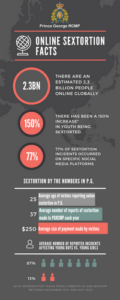Prince George has seen a 50% spike in the number of online sextortion reports.
According to the RCMP, they have received 30 files between January and July of this year an increase of more than double when compared to the same time period last year.

Sextortion is the practice of extorting money or sexual favors from someone by threatening to reveal evidence of their sexual activity.
The scam involves the victim being befriended online by someone, typically someone unknown to them.
The new person then asks the victim to send nude photos or videos of themselves performing a sexual act; once this is done, the victim is then told to send money or more content. They are told that if they do not comply with the demands, the photos and/or videos will be sent to their friends, family, or coworkers, or will be distributed online.
“Of the incidents that are reported to police, many of the victims are young males in their teens and early twenties, stated Cpl. Jennifer Cooper.
“It can be very scary for someone who is being targeted like this. We are urging the public to educate themselves on the dangers of sharing intimate images and videos of yourself online, particularly with people you have never met.”
The average age of victims reporting online sextortion is 25.
In addition, the average size of payment made by victims is $250.
The Prince George RCMP issued a few safety tips while online:
- Remember everything online is instant, public, and permanent
- Don’t accept friend requests or chat with people you don’t know in real life
- Use the platform’s privacy settings to limit the information you broadcast on social media
If you are the victim of a sextortion scam, it is important that you stop all communication immediately with that person and do not give in to their demands.
Deactivate the accounts that you are using to communicate with that person and, most importantly, reach out for help and report it. Call your local police and contact NeedHelpNow.ca and Cybertip.ca for support.


